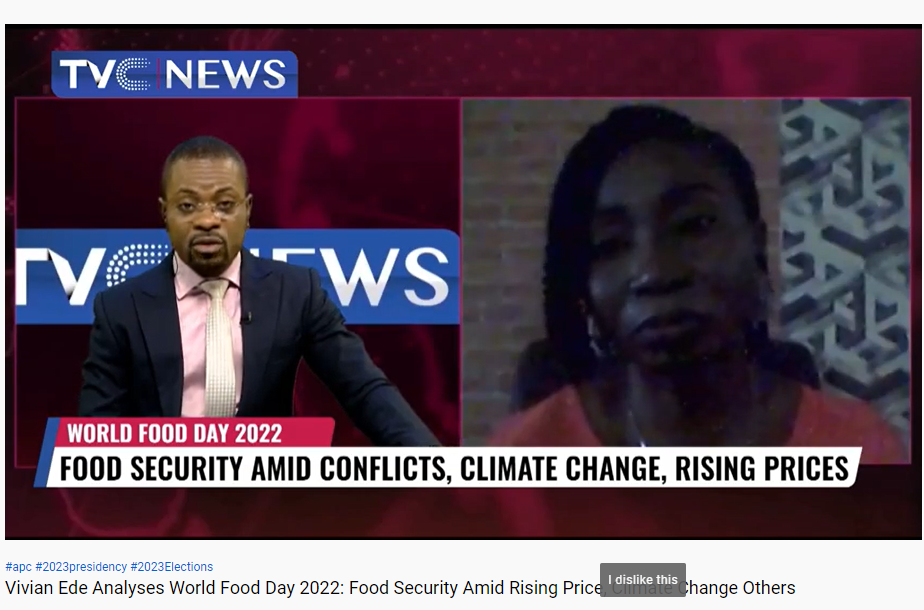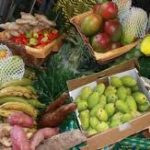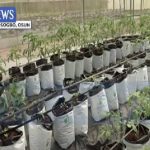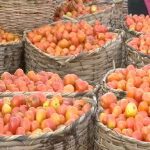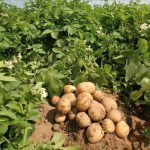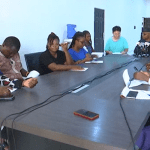The Federal Government and all Other stakeholders have been urged to come together and invest more into the Agriculture Sector to ensure food sufficiency and Security for all Nigerians.
Dietitian, Vivian Ede, made the call while featuring on TVC News in commemoration of the 2022 World Food Day.
Mrs Ede who harped on the importance of Food Security in tackling poverty said the global upheavals and crisis in Ukraine and the lingering effects of the Covid 19 Pandemic has made it imperative for more investment in Agriculture.
She added that more investment in Agriculture will help in ensuring food Security as importation is not sustainable in the long term even for so called rich countries.
According to her, the astronomical rise in the prices of food across the World and especially Nigeria is a confirmation of a prediction made in 2021 that 21.1 Million Nigerians will face food shortage occasioned by insecurity in 2022.
Flooding which has now affected over 890 farmlands across the cou8ntry has also not made the situation better with more challenges on the horizon.
She however said the investment she is calling for should not be a government thing alone but for all stakeholders.
Read More Below…
“Thank you very much for having me, World Food day is celebrated all over the world, 15 October of every year. And this is so important, and it’s up, especially at this point in time, where we are still trying to recover from COVID-19 Pandemic, the war between Russia and Ukraine, insecurities everywhere.
So it’s very important, and this theme is also very apt at this point to leave no one behind, let everyone be inclusive in achieving food security, in achieving access to nutritious food. So it’s very key and important that this is celebrated to create awareness all over the world about nutritious food and access to food security.
Well, for the Sustainable Development goal, which states in the second goal that by 2030, we should have zero hunger all over the world. But if you look at Nigeria, especially in this year, 2022, you would agree with me that I think we are still far fetched from that particular goal.
If you look at the rising food prices, the inability of people to be able to consume even three meals a day, a lot of children cannot even eat. The school program, I don’t know how far it has gone in a lot of schools in Nigeria. So you find that Nigeria is far behind.
There was a report in 2021 that in this year 2022, you have about 12.1 million Nigerians who would be involved in food and security crisis. And if you look around, if you go to the market, you will know that this is true because everything has risen, both from processed food to natural food.
And then with the flood coming in, the damage is so substantial. About 890 farmlands were actually destroyed by the recent flooding. It’s been flooded because of climate change. So if Nigeria would not do much to prepare and avoid this climate change, the one that we can avoid, the one that we can prevent, and I can assure you that it is far fetched to achieve this zero hunger by 2030 for Nigeria, there are a lot of rules, a lot of policies that have been offered that has been proposed.
But you find out that implementation of this policy has become a challenge. If you look at something like exclusive breastfeeding, which Nigeria just has 29%, and for world Health, it is stated that at least by 2025, every country all over the world, you have about 50% of exclusive breastfeeding.
Exclusive breastfeeding is something that can offer a child, particularly zero to six months food security. But if you look at the rates of our status in Nigeria right now at about 29%, we find that we have a lot of work to do.
So in achieving this zero hunger, I don’t think Nigeria will be able to achieve this by 2030, except all hands is on deck, from corporate bodies, to professionals, to the farmers, to the government putting hands together to achieve this.
But personally, from my own end, with all the statistics that we’re seeing, with the stunting levels, the northwest, the insecurities, the conflict everywhere, I don’t think we can achieve this.
Agriculture is the key. Agriculture is the answer, right? They need grants. They need to observe or do what we call mechanized faming because it will not be easy to continue to import. This would have a negative effect even on our economic growth. So if we empower the farmers and they are able to achieve mechanized farming, that will lead to more production. This will help us cope with the economic crisis that we would have as a nation.
If you look at even the countries that are importers, from Russia, from Ukraine, getting food products for some time now, that has not been achievable. So for us here in Nigeria, to be able to combat that, we need to empower the farmers. Everyone needs to get involved. Investors need to come in. It’s not just the government that can do this.
Corporate bodies can invest so that we can expand the agriculture. And this is the only way we can meet up with the teammate population increase in Nigeria and even all over the world. If we begin to produce this, we have arranged lands. If we begin to produce, we can also export and then improve our own GDP, even here in Nigeria”.

